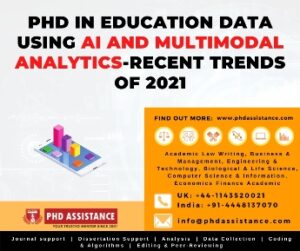Phd In Education Data Using AI And Multimodal Analytics- Recent Trends Of 2021
Introduction
The recent trends of PhD in education data is focusing on changing technologies and the technique of learning them. AI and Multimodal analytics is grabbing all the attention because of its ability to achieve excellent performance levels. The excellence can be measured in algorithms where decision making is easier. Moreover, AI performs better than humans in detecting real-time errors and classifying images.

Multi-modal data on the other hand supports machine learning which includes recognition of human activity, real-time applications and information retrieval of AI. By depicting the evolution of AI and Multimodal analytics the PhD scholars can understand the nature of their research stream. Model-driven analytics data approaches help to guide the interpretation, validation and development of algorithms.
Approaches Of AI and Multimodal Analytics
While multi-modal data can be imbalanced and complex, machine learning classifies imbalanced data. Thus, multi-modal data is a challenge in understanding deep learning to classify data.
Machine learning focuses on various aspects and arranging imbalanced data. The main aim of such a project is to feature approaches of engineering for the multi-modal data. They also identify whether multi-modal data is improving the results using specific learning tasks by AI. It develops methods and computational approaches for imbalanced information in multi-modal data.
For instance, the experience of hearing a sound, seeing objects, smelling odour is all multimodal. This refers to experiencing something when it happens. While problems related to research is classified under multimodal and it includes modalities.
For artificial intelligence to work better and provide a clear understanding it needs to interpret multimodal signals. For instance, images use text and tags to explain the concept. Similarly, the text uses images to express the concept clearly. Various modalities are classified using statistical properties.
Artificial Intelligence and Its Importance In Phd Education Data
The education sector is revolving around AI. Moreover, in 2021 AI has reached new heights in contribution to AI. Students are involved in AI to progress and also to gain knowledge and a better understanding of the subject.
This technology assists in teaching and it offers better-automatized grading. This also eliminates the routine tasks of educators. It assists in using chatbots to solve the queries of the students and instruct them about the assignments. This saves student’s time. Thus, students and teachers can concentrate better on helpful personalized feedback.
With the help of chatbots, you can get the necessary information via email or messenger. In fact, such a technique is more interactive. It makes learning easy also simplifies the matter.
There is no benefit to students related to standardized practices. You need to make the learning process more precise to understand the matter. You need to take the help of customized courses and various reading material using AI. You can also use big data, it helps you in academic performance, interest and learning objectives. You can boost your engagement with AI.
Another reason to incorporate AI in PhD is to support better decision making. Usually, the education sector deals with large data set. However, it’s of no use without AI computational methods. Thus, combination of AI and Multimodal analytics is necessary for effective and quick decision making and learning.
Why AI And Multimodal Analytics Is Useful In Phd
There are many reasons to use AI and Multimodal analytics in PhD. Some of the advantages are:
- Improves teaching methods:
Technology makes education more innovative. It allows you to imbibe knowledge through various source such as videos, animation, etc. So, there are various learning styles. Moreover, you can create your own space at your comfort to imbibe the best knowledge.
- Collaborative Teaching:
With the help of AI, it is possible to be in touch always. Professors and students can discuss, clear matters and share opinions collaboratively. With collaborative learning, students can strengthen their skills and come up with new ideas.
- Collects contemporary information:
With multiple sensors, it is possible to collect various trends and contemporary information which otherwise is difficult to collect with individual modalities.
Technology empowering studies using AI and Multimodal analytics is convenient. This will promote engagement and also encourage creativity. Moreover, it offers valuable insights to define a subject and give prospective new thinking. Multimodal learning combined with AI can power business and optimization of business operations. It also improves automated compliance marking and improves the content. Many organizations have adopted this feature to empower their business and give a new turn to their operations.
Conclusion
The main factor is AI and multimodal analytics are becoming an important aspect for PhD students as well in the business world. It will become one of the key trends and will soon transform the traditional process of learning. The evolving future and recent development in AI and Multimodal Analytics offers a good future to PhD scholars. The deployment and rising advancements are no surprise to offer a better and secure future of the PhDs scholars.
References:
- Cukurova, M. (2019, May). Learning analytics as AI extenders in education: Multimodal machine learning versus multimodal learning analytics. In Proceedings of the Artificial Intelligence and Adaptive Education Conference (pp. 1-3).
- Blikstein, P., & Worsley, M. (2016). Multimodal learning analytics and education data mining: Using computational technologies to measure complex learning tasks. Journal of Learning Analytics, 3(2), 220-238.
- Sharma, K., Papamitsiou, Z., & Giannakos, M. (2019). Building pipelines for educational data using AI and multimodal analytics: A “grey‐box” approach. British Journal of Educational Technology, 50(6), 3004-3031.
- Emerson, A., Henderson, N., Min, W., Rowe, J., Minogue, J., & Lester, J. Multimodal Trajectory Analysis of Visitor Engagement with Interactive Science Museum Exhibits.
- Zhai, X., Chu, X., Chai, C. S., Jong, M. S. Y., Istenic, A., Spector, M., … & Li, Y. (2021). A Review of Artificial Intelligence (AI) in Education from 2010 to 2020. Complexity, 2021.
 Previous Post
Previous Post Next Post
Next Post
